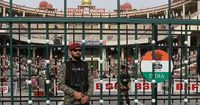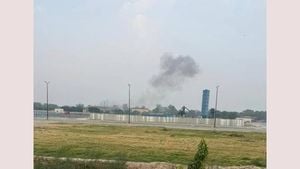On May 6, 2025, a significant escalation of tensions between India and Pakistan unfolded as India launched military strikes targeting what it described as "terrorist infrastructure" across the border. This operation, dubbed 'Operation Sindoor', involved attacks on nine sites in Pakistan and Pakistan-administered Kashmir, following a deadly attack on Hindu tourists in Indian Kashmir that left 26 people dead just weeks prior.
According to reports from the Indian government, the strikes were aimed at locations where attacks against India were allegedly planned and directed. Indian officials emphasized that their actions were "focused, measured, and non-escalatory in nature," asserting that no Pakistani military facilities were targeted. However, the Pakistani military quickly condemned the strikes, with spokesman Lieutenant-General Ahmed Sharif Chaudhry labeling them a "heinous provocation" and warning that Pakistan would respond at "a time and place of its own choosing."
The situation on the ground was tense, with multiple loud explosions reported in various locations across Pakistan and Pakistani-administered Kashmir. Witnesses in Muzaffarabad, the capital of Pakistani Kashmir, described hearing jets overhead and noted that the explosions led to widespread power outages in the area. Initial assessments indicated that at least three people had died, and 12 others were injured as a result of the strikes.
This military response comes in the wake of rising hostilities that have characterized the relationship between the two nuclear-armed neighbors. The recent violence was triggered by an attack on April 22, 2025, when armed militants opened fire on a group of Hindu tourists in Indian-administered Kashmir, resulting in a tragic loss of life. India has consistently blamed Pakistan for harboring the militant group responsible for the attack, namely Lashkar-e-Taiba, which is designated as a terrorist organization by the United Nations.
In response to the escalating violence, the Indian government has taken a hardline stance, with Prime Minister Narendra Modi declaring that India will "identify, track, and punish every terrorist and their backer" involved in the attack. As tensions simmer, the Indian police have issued wanted posters for three suspects linked to the incident, two of whom are believed to be Pakistani nationals.
Since the attack, both nations have exchanged nightly gunfire along the heavily militarized Line of Control, the de facto border in Kashmir, further heightening fears of a larger conflict. The situation has drawn international concern, with the United States State Department urging both countries to seek a responsible resolution to the crisis. State Department spokeswoman Tammy Bruce emphasized the importance of maintaining long-term peace and regional stability in South Asia.
As the conflict intensifies, the Pakistani military has conducted missile tests, including those of a surface-to-surface missile capable of reaching targets up to 450 kilometers away. This demonstration of military capability underscores the seriousness of the situation and the potential for further escalation.
In a related development, Indian Prime Minister Modi recently announced plans to stop the flow of water from India into Pakistan, a move that has been characterized by Pakistani officials as an "act of war." The Indus Waters Treaty, which governs the sharing of river waters between the two countries, has been a longstanding point of contention, and Modi's remarks indicate a willingness to leverage water resources as a means of exerting pressure on Pakistan.
In the aftermath of the strikes, the Pakistani government vowed that the Indian actions "will not go unanswered," reinforcing the likelihood of a retaliatory response. Pakistani officials have characterized the Indian military operation as an attack on civilians, a claim that has yet to be independently verified.
The historical context of this conflict is crucial to understanding the current hostilities. Since the partition of British India in 1947, Kashmir has remained a flashpoint for conflict between the two nations, both of which claim the region in its entirety but administer only parts of it. The territorial dispute has led to multiple wars and ongoing violence, with both sides accusing each other of supporting insurgency and terrorism.
The international community has been watching the developments closely, with calls for restraint from various quarters. The United Nations has expressed concern over the potential for military confrontation, recognizing that the stakes are particularly high given the nuclear capabilities of both countries.
As the situation continues to evolve, the potential for further military action looms large. With both nations bracing for possible retaliation, the need for diplomatic engagement has never been more urgent. The historical grievances and mutual distrust between India and Pakistan create a complex backdrop for any attempts at resolution, making the current crisis a critical moment in South Asian geopolitics.
In summary, the military strikes conducted by India against Pakistan on May 6, 2025, represent a dangerous escalation in an already volatile situation. As each side prepares for potential retaliation, the international community remains hopeful for a de-escalation of hostilities and a return to dialogue.





